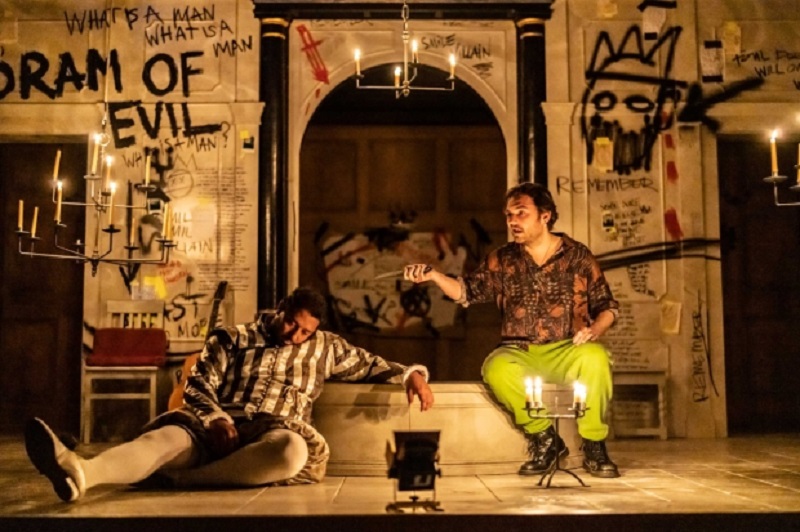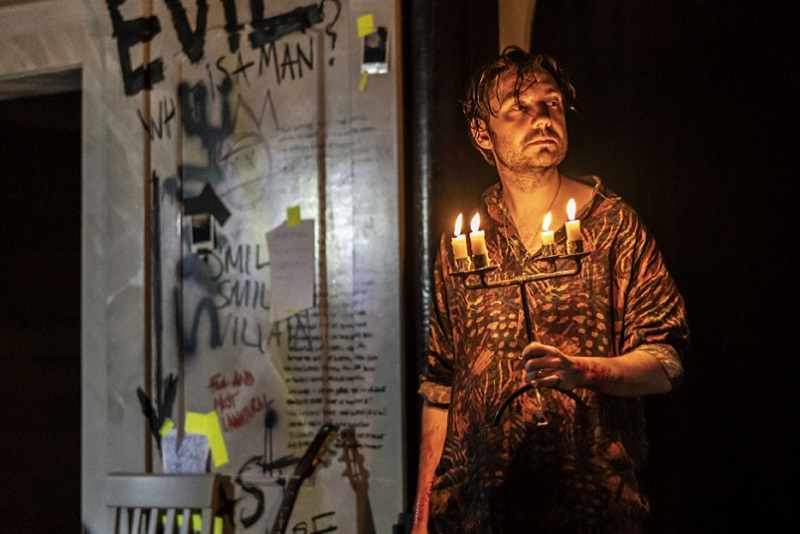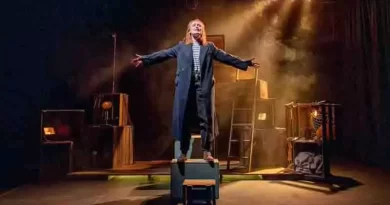“Hamlet”, Sam Wanamaker Playhouse
Tom Bolton on the South Bank
4 February 2022
Sean Holmes’ production of Hamlet in the Globe’s indoor space opens with a snatch of “Oh Mother, I can feel the soil falling over my head”, from The Smiths’ song ‘’I Know It’s Over’’. Then the candles are doused, the theatre plunges into darkness, and we are on the walls of Elsinore. This is about as conventional as the production gets. The next scene, rather than introducing Hamlet through his meeting with the Ghost, skips forward in the play and it is several scenes before we return to the castle walls. Every production of Hamlet is an exercise in editing and rearranging competing versions of the play into a version that is not only coherent, but also short enough for the audience to get home afterwards. Usually, the audience barely notices how the effect has been achieved. If they do, the rationale should be clear. However, the intention behind Holmes’ rearrangements is never clear, and the confusion feeds into many aspects of his production.

Irfan Shamji and George Fouracres. Photo credit: Johan Persson.
The set, by Grace Smart, features the neat device of an ornamental pool in the centre of the stage. This is used in inventive ways: for Hamlet to teeter on its brink, to douse chandeliers by lowering them into the water, and, eventually, to contain the dead. One of the evening’s most effective moments comes when the lights suddenly go up to reveal Ciarán O’Brien’s semi-clad, furious Ghost standing in the water. It is hard to imagine a more threatening Ghost, full of rage at his treatment. However, this interpretation unbalances the play a little, especially when he later returns to waterboard his indecisive son. It is hard to escape the feeling that the elder Hamlet may not have been a pleasant man or a good king, and sympathies begin to tip unexpectedly towards his murderer.
The feeling is amplified by the portrayal of the prince himself. Hamlet is played by George Fouracres, an actor who made his name as part of the comedy trio Daphne. He is a Black Country prince, delivering the famous lines in a broad Wolverhampton accent. Despite the efforts of companies such as Northern Broadsides to normalize regional accents in Shakespeare, this is still something that is rarely heard. His distinctive tones resonate with the language, giving it a different musicality and revealing new inflections on well-known speeches. Shakespeare and his contemporaries are thought to have spoken in an accent much closer to modern West Country than to received pronunciation, so this is arguably a more authentic approach.
However, Fouracres is a very downbeat Hamlet, and a remarkably unsympathetic one. Holmes’ decision to dress him as Morrissey, in a far-from-subtle continuation of The Smiths theme, seems to match his misanthropic spirit. In a paisley shirt, skin-tight black jeans, and sixteen-hole Doc Martens, Fouracres resembles someone working behind the counter of the Oxford Street Virgin Megastore around 1995. There has rarely been a more morose Dane, but the characterization feels unsubtle, and foregrounds the least attractive aspects of the character’s behaviour. Hamlet seems most alive when viciously attacking both Ophelia and Gertrude, as though this was his real revenge. Misogyny may be a true reflection of the entitled nineties male, but it makes Hamlet very hard to like.

George Fouracres as Hamlet. Photo credit: Johan Persson.
The production’s confused approach manifests itself in an uneven set of performances from the cast, who fail to present a unified approach to the play. Polly Frame, as Gertrude, is an honourable exception and her scenes have a coherence and weight that is unfortunately lacking elsewhere. Irfan Shamji plays Claudius as a klutz, without any sense of menace or the ruthlessness needed to seize the throne. John Lightbody’s Polonius is broad and comic, a fool through and through who plays to the crowd, but eliminates any sympathy for the character with his ludicrous behaviour. Rachel Hannah Clarke’s portrayal of Ophelia seems to change from scene to scene, and she appears most at home when involving the audience in the call-and-response popular with drunken cricket fans: ‘Everywhere we go / The people want to know / Who we are / Where we come from.’ This, it can safely be said, undercuts the effectiveness of her mad scene, substituting emotional impact for brief, irrelevant audience engagement.
Holmes contrives to make Hamlet much more confusing than needs to be. Cuts mean that Hamlet is suddenly considered mad, without any apparent lead-up, while his relationship with Ophelia progresses in jump cuts. The director takes the surprising decision to include the two courtiers Cornelius and Voltemand, whose tiny parts are usually absent, but transfers Claudius’ confusion over which is which from Rosencrantz and Guildenstern to them. Later, the same actors morph into Rosencrantz and Guildenstern anyway, without explanation. Individually, decisions such as these are quibbles but there are too many of them to avoid.
Holmes’ approach strongly implies a lack of confidence in the play to engage the audience, or in the audience to last the course. The Gravedigger is played by composer and on-stage guitarist Ed Gaughan, who breaks the fourth wall to explain how difficult it is to make his scene funny, and how by this point in the play everyone is usually getting tired. As if to illustrate, he then delays the final scenes by another few minutes with a series of lame jokes about TV quiz The Chase, as if the audience need to be cajoled into paying attention with some second-rate stand-up. This sums up the problems with a production that seems most comfortable when it can find a way to avoid taking the play seriously.

Principals and ensemble. Photo credit: Johan Persson.









